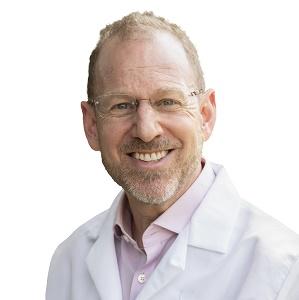For Charles Brenner, Ph.D., it’s all about the questions.
“I want to ask the question nobody else will ask,” he said. “We generally don’t know what we don’t know. We don’t know how to ask outside our normal awareness. Anytime I’ve made progress, it’s been by trying to ask the right question before anyone else.”
He’s made some formidable progress by doing just that.
It was Brenner, one of the foremost biochemists of his generation, who discovered something totally unexpected about nicotinamide adenine dinucleotide, or NAD, an essential molecule found in every living cell and the life force that propels metabolism, catalyzing the chemical reactions required to generate energy as well as build and repair every part of our bodies.
“You might think NAD, the crown jewel of metabolism, would be locked up safely in a vault,” said Brenner.
But it turns out that NAD is disrupted and degraded by diet, environment, inflammation, diseases including cancer and diabetes and, as Brenner most recently found, by the virus that causes COVID-19.
Diminished NAD makes those serious conditions worse, impairing the body’s ability to repair itself.
In 2004, Brenner’s lab found a pathway to restore and rebuild NAD using an unanticipated building block, nicotinamide riboside or NR. “We were the ones going against the received wisdom that all pathways to NAD were known,” he said. So significant was his discovery that NR has been commercialized and is now available as a safety-tested nutritional supplement that is also being clinically tested for diseases and conditions in which NAD is under attack. Brenner is the chief scientific advisor of ChromaDex, which licensed and developed his technologies.
All from asking the right questions.
'What Great Scientists Do'
“That’s what great scientists do,” said Paul B. Rothman, M.D., CEO of the Johns Hopkins Health System. Rothman knows Brenner from their time together a decade ago at University of Iowa. “Charlie is a brilliant scientist, innovative and impactful.”
Ask others about Brenner and that “b” word keeps coming up.
“Quite simply, Charlie is brilliant,” said Stanford University biochemist Roger D. Kornberg, another colleague and the 2006 Nobel Prize winner for chemistry. “[He’s] a creative, critical and extraordinarily successful scientist. He has founded a field of great fundamental and medical significance.”
At City of Hope, where Brenner is the Alfred E Mann Family Foundation Chair in Diabetes and Cancer Metabolism, he plans to build on that success by once again being the first to ask fundamental questions.
He now heads a department that has never existed anywhere else, but is tailor-made for City of Hope and a perfect fit for Brenner’s knowledge and abilities.
He chairs the just-created Department of Diabetes & Cancer Metabolism. Its mission is to focus on the metabolic disturbances that underlie both diseases. There are more than most people think. It’s a natural step for City of Hope to take, given its 75-year track record in cancer and diabetes research, which includes discoveries on the mechanism of action of insulin, the development of recombinant insulin, humanized monoclonal antibodies and other breakthroughs.
So, how did Brenner come to leave his position as head of biochemistry at Iowa to take on this new endeavor?
How else …
He asked a question!
“I’d brought Charlie to City of Hope for a seminar,” said his new boss and old friend Debbie C. Thurmond, Ph.D., the Ruth B. & Robert K. Lanman Chair in Gene Regulation & Drug Discovery Research and director of the Diabetes & Metabolism Research Institute at City of Hope. As they chatted in her office, Brenner asked, “So what’s going on?” Thurmond described the new cancer/diabetes department about to be born. Brenner immediately agreed to be considered for the position of inaugural chair.
“We had four incredible candidates,” recalled Thurmond. “But Charlie really stood out, as a professor who could also be an effective leader and as a researcher that clinicians are excited to work with.”
He’s done it before. His old boss at Iowa remembers how Brenner took charge there.
“He knew he’d have to reach out,” recalled Rothman. “He totally embraced the institution and looked for people who could collaborate across departments. He built bridges that were never there before. He became a leader very quickly. He has great attitude, energy and vision.”
Raring to Go
Those qualities are wrapped up in Brenner’s hard-to-ignore personality: voluble, gregarious, funny, informal (everybody calls him Charlie) and super high-octane (“Inertia is not part of his character,” laughed Thurmond). A few weeks into his new job, Brenner is already reaching out to build his research team, as well as to recruit metabolism-focused faculty colleagues from other institutions. On Zoom calls scheduled as early as 6 a.m., he plans experiments and analyzes data with colleagues around the world. And he is taking steps to move several projects he brought with him past their initial phases into deeper mechanistic work and, in some cases, into randomized clinical trials.
He is so devoted to his work it’s surprising to learn that as late as college, Brenner hadn’t chosen a career direction.
“I was a biology major,” he remembered, “But I was also into history, political science, debate and theater.” Outside of school, he’d developed multiple interests. He cooks and enjoys music. He’s a fitness buff. He loves to work with his hands. He’s worked as a janitor and as a drill press operator.
So ultimately, how did he decide?
How else? He heard the right questions!
“A year after spending a summer running a four-spindle drill press, I stayed on campus to do summer research with a historian and a biologist. My history professor wanted me to look up citations for not fully remembered quotes, but my biology professor wanted me to figure out what makes a fruit fly male. I love working at the edge of what is known and expanding the known universe.”
Having created much excitement through his NR/NAD discoveries, Brenner can’t wait to take the next steps.
“Discovering the ways in which NAD comes under attack is fundamentally important for treating many diseases,” he said. “I am pleased that our lab is known not just for NR but for analyzing regulation and repair of metabolism throughout the NAD system.”
He believes City of Hope provides him with the perfect environment to do just that.
“City of Hope is a remarkable institution,” he said, “where doctors and researchers are highly committed and remarkably well resourced to provide for the betterment of the world. I’m delighted to be joining.”
Unsurprisingly, Nobel laureate Kornberg expects big things of Brenner.
“The best,” he said of his friend, “is yet to come!”

